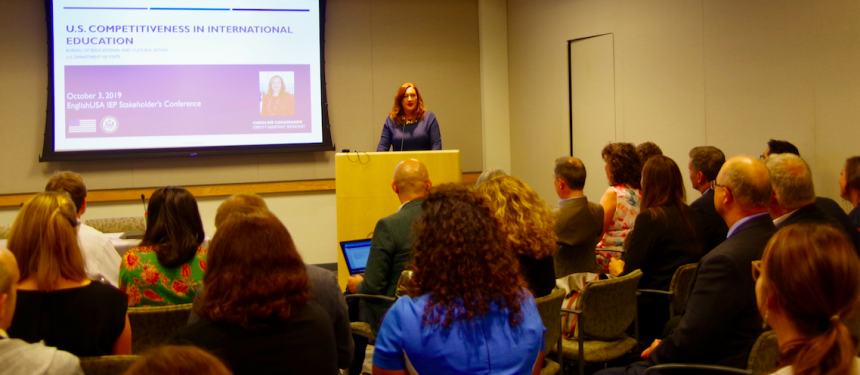The US Department of State touted the role of intensive English programs (IEPs) in the USA’s security and diplomatic strategy while offering words of support to members of the field after three years of a precipitous decline in IEP enrolment numbers.
News and business analysis for Professionals in International Education
Have some pie!
State Department offers words of support for US IEP sector
 "You are on the front lines of the US diplomatic mission" said Casagrande. Photo: The PIE News
"You are on the front lines of the US diplomatic mission" said Casagrande. Photo: The PIE News “Perhaps you did not think about yourself before today as part of the US State Department’s diplomatic mission, but you absolutely are on the front lines of that, making sure we have the relationships with the next generation of world leaders,” ECA deputy assistant secretary for Academic Programs Caroline Casagrande told attendees of EnglishUSA’s IEP Stakeholders Conference.
“Success in English paves the way for students in the international context”
IEPs are key to creating pathways to the US higher education sector for international students worldwide, Casagrande continued.
“We know that you play a critical role in helping us attract the world’s best and brightest international students. We know that to study at US colleges and universities, in our classrooms, we have to have these pathways built. And you are the builders of those pathways,” Casagrande said.
“Success in English paves the way for students in the international context. It means an economic benefit to international students and to America.”
According to the Department of Commerce, international students contributed $45bn to the US economy in 2018.
Last year, the total number of international students in the US reached an all-time high of 1.09 million, but new enrolments within that number were down by 6.6%.
More than 78,000 international students were enrolled in IEPs during the calendar year 2018. The State Department would like to see those numbers grow, Casagrande said.
Casagrande’s remarks offered encouragement to the IEP sector, which has experienced turbulence in recent years, as the conference title, ‘Mission Possible: Thriving in Times of Change’, alluded to.
[Casagrande’s] remarks gave everyone in the room real hope that internationalisation is an important priority for the government
IEP participation numbers dropped by 42% from a historic high 2015, according to the annual Open Doors Report on International Educational Exchange.
“[Casagrande’s] remarks gave everyone in the room real hope that internationalisation is an important priority for the government, and that what we’re doing is incredibly valued and important,” commented Nadine Baladi, immediate past president of EnglishUSA and founding partner at the Parliament Group.
“It was the message that we needed to hear from a senior government official.”
Cheryl Delk-Le Good, executive director of EnglishUSA, told The PIE News, “EnglishUSA remains optimistic about the future of the industry.”
She added, “Our members have always been resilient in times of change in the past, and this period is no different.
“English language programs are adapting to the shift in prospective learner, professional and academic needs.”
US IEPs have been hard hit by a number of external factors, including increased competition from English language instruction providers overseas. Other factors are country-specific, such as cuts to the King Abdullah Scholarship program which previously supported greater numbers of Saudi Arabian students participating in IEPs.
“The privileged position of Anglophone countries such as the US in offering English-language training is being challenged because students are now able to obtain the same training either in their own home countries or at a lower cost in other countries, ranging from China to the Netherlands,” noted Rajika Bhandari, an international higher education expert.
However, Casagrande was optimistic about the future.
“Our members have always been resilient in times of change in the past, and this period is no different”
“We have the best higher education system in the world, and that saves us year after year. We are selling the best brand in the entire world. And as long as that remains true, we can continue to remain the global leader,” she urged.
Casagrande affirmed the State Department’s commitment to encouraging international students to choose the US as their destination for higher learning.
“We all go to work every day with the idea that if we can get more [international] students into the United States, we are making the world a safer place. We say it all the time, ‘We move people, to move ideas, to move policy.’”
Still looking? Find by category:



I would be interested in knowing what the U.S. State Department is specifically doing encourage English language study in the United States. What are the action plans in place in the primary markets and what is the annual budget. Words of support are wonderful, but they alone will not increase the flow on international students to IEPs.